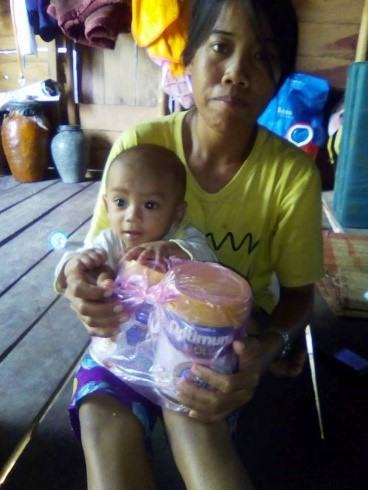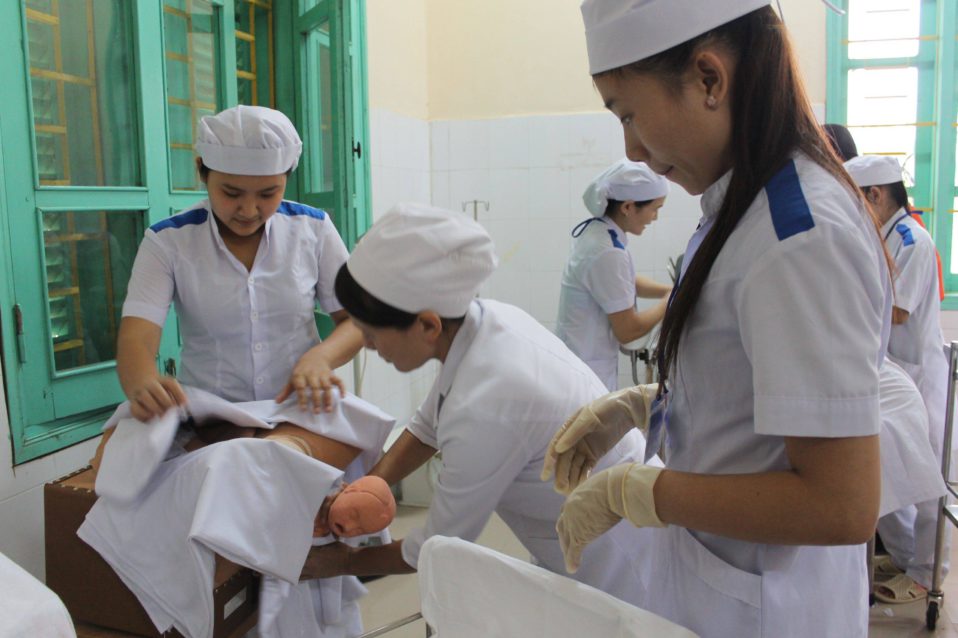All over Vietnam women are working hard, in the rice-fields, in small shops and restaurants, but also sweeping streets in Hanoi and Ho Chi Minh City in the dead of night. These women work as busy bees, but what if something goes wrong?
Learning through health research
Background
Research is vital for informing and underpinning MCNV’s interventions and ensuring that we can understand their impact. It also helps to ensure that knowledge is generated to inspire new ideas, catalyse innovations, and provide evidence to policy makers to inform their decision making and help ensure that policies are effectively implemented. The publication of research also helps to inform others of new processes, methods, techniques and ways of thinking that contributes to improved ways of working to reduce poverty and improve health.
MCNV’s responses
In Lao PDR, MCNV runs the LEARN (Lao Equity through policy Analysis and Research Networks) this a 5 year program that is funded by the EU Commission to enhance the capabilities of public health institutes in Laos. Working together with a range of partners the program aims to ensure that the Laos National Institute of Public Health becomes of centre of excellence for the provision of evidence-based and contextually adapted policy advice. This evidence is used to enhance decision making and improve the implementation of health policies both within Laos and the wider Greater Mekong Sub-region (GMS)
LEARN brings together a unique range of partners to achieve this goal. As well as the Laos National Institute of Public Health, LEARN also brings together the University of Health Sciences in Laos, the VU University in the Netherlands, the Hanoi School of Public in Vietnam and MCNV, an international NGO that has been working in the health sector in the GMS for many decades.
These partners come together to help ensure that:
- Effective and convincing evidence is available to policy-makers who are better able to use it for policy making and programming
- The National Institute of Public Health and its partners have increased access to finance, skilled human resources and information.
- Researchers are able to produce high quality research and are able to convincingly present results and recommendations to a wide range of stakeholders.
Expected results
During its 5 year implementation the program will support a range of activities including;
- International scholarships for Lao researchers to gain Phd’s
- A joint Masters in Public Health Program between University of Health Sciences and Hanoi School of Public Health
- Upgrade of IT facilities and introduction of public health e-learning resource centre
- A research grant scheme to support the production of high quality research with Laos
- Development of a long-term strategic plan for National Institute of Public Health
- A wide range of workshops and trainings in areas ranging from ethics, transdisciplinary research practice, and production of policy briefs.
In addition to this major project, MCNV also conducts research in a wide range of areas including the impact of its agricultural interventions on nutrition and how these can be scaled-up, the use of IT in development, the control and prevention of malaria, the effectiveness of self-help groups in empowering people living with HIV and examining barriers to policy implementation in areas as diverse as the provision of mental health services and access to mother and child healthcare. Research is often conducted in partnerships with Dutch Universities such as VU University. The research is action-based and reflective and is designed to ensure that all people are involved in the process, for complex issues such as malnutrition, multiple stakeholders and engaged in the research and transdisciplinary approaches are used. MCNV’s works in research helps us to understand better the world around us and ensures we can support people within development processes to make the world a better place.
MCNV and AFAS Foundation unite against malnutrition in Laos
On November 4th MCNV and AFAS Foundation signed a collaboration contract in Amsterdam. A contract on rural development and food security in the coming years in Laos.
MCNV participated in International Conference on Public Health
From November 5th – 6th, MCNV participated in the 8th International Conference on Public Health Among Greater Mekong Sub-Regional Countries,
MCNV Supports the 10th National Health Research Forum in Lao PDR
MCNV was delighted to support the 10th National Health Forum held in Savannakhet province, Lao PDR, as part of the EU funded LEARN program.
Stimulating Entrepreneurship among vulnerable groups
BACKGROUND
Entrepreneurship is about leadership, innovatively, creativity and about envisioning and exploiting possibilities. Several programs have shown the positive influence of entrepreneurship on poor and marginalised people. When they find ways of earning money they feel respected, it helps them to get into daily routines, and it makes them proud to be able to contribute money to their families and communities. The development of different types of Community managed Development Funds combined with entrepreneurship trainings and trainings on financial literacy, have already assisted thousands of people to improve their living conditions. MCNV plans to increase activities in the field of entrepreneurship especially in Vietnam.
MCNV’S RESPONSES
The market economy offers a proportion of marginalized people chances to escape their poverty. However, many face barriers of access, lack necessary capabilities or do not recognize, or even believe, that they have chances. For this reason it is important for MCNV to study and take into account how local market systems work and identify barriers and facilitators for access by marginalized groups. The work with market systems takes various forms in different programs/projects, and at different levels of development.
Almost all ethnic minorities were dependent on self-subsistence farming and have increasingly come into contact with ‘the markets’. First the traders came via the new roads (opened for ‘development’) to them from elsewhere to buy agricultural products at the farm gate. But after that these traders established shops right in the farmers’ communities and used their knowledge and networks to become ‘middlemen’ between the local producers and outside markets. The impact of these middlemen is manifold: on the one hand they help poor farmers creating new sources of income, new crops and agricultural knowledge, but on the other hand it is in their interest to keep the farmers dependent on them, for instance via debt traps and protecting their local monopolies. In the Community-Managed Health and Livelihood Development project in Khanh Hoa province (2004-2016), MCNV has worked long with ethnic minority communities to help them increase their aspiration, self-confidence and knowledge and to gradually reduce their dependencies on the middlemen, as well as on the local government.
A next step in ‘working with the market to alleviate marginalisation and poverty’ is best illustrated by MCNV’s Microfinance projects, such as that managed by the Women’s Union in Ben Tre, where poor women groups learn to save and invest money to set up and grow small businesses. Basic “financial literacy” is often lacking among the marginalised target groups and therefore MCNV is building this capacity among many groups, like for Disabled People’s Organisations to know how they could act best to maintain and gradually grow their Revolving Funds.
Future plan
Many further steps are needed to make the market work best for the poor. A large majority of Vietnamese farmers are small-holder farmers who certainly do not lack entrepreneurship or financial literacy, but they are poorly organised, which significantly decreases the influence and the “Value Chains” of their products. In Quang Tri province, Vietnam, MCNV is developing relationships with farmer’s cooperatives, and agricultural producer groups. In the near future, MCNV intends to link these initiatives to farmer groups and value chain development in neighbouring area’s in Lao PDR, thus enhancing cross-border value chain development.
a.s.r – Dutch insurance company to pilot a “Community Income Protection Insurance” for poor women in Ben Tre province
Climate change and saline intrusion in the Mekong Delta, Vietnam has caused negative impacts for millions of inhabitants who live in coastal areas. Poor families who live on fisheries and agricultural production have suffered from income loss due to less yield crops and worsening health conditions.
Towards improvement in inclusive education for children with disability
On December 12th 2016, the Department of Education and Training (DoET) of Quang Tri Province, MCNV and the Korean INGO Medipeace co-organized a workshop to share results of an assessment on inclusive education (IE) for children with disabilities (CWD) recently done in the province. Participating in the workshop were representatives of provincial- and district-level organisations of the education sector, labour, invalids and social affairs sector, health sector and finance sector, the Disabled People’s Association, the Village Health Workers’ Association, the Charity Association and some INGOs. Besides sharing the IE assessment results, the DoET of Quang Tri Province, MCNV and Medipeace also consulted the relevant parties about the proposed plan on IE development in Quang Tri in the period of 2017-2020.
Earlier in October and November 2016, MCNV provided technical support to and collaborated with the DoET of Quang Tri to do a survey in Cam Lo, Gio Linh and Huong Hoa districts and Dong Ha city to assess the current situation of IE. The assessment results would be used for the orientation of interventions in improving the IE work in Quang Tri. Statistics show that Quang Tri province has about 37,000 people with disabilities, in which there are more than 6,300 CWD, counted for 1.1% of the population. Key findings from the assessment unveil that the education sector and other relevant sectors currently face a lot of challenges in the IE for CWD, particularly in implementing the supporting policy, ensuring financial sustainability, multi-sectoral collaboration, building capacity for teachers and parents of CWD, and improving the participation of CWD at schools. Key solutions identified and agreed upon at the workshop include: (i) setting up and developing a sustainable system of technical assistance and provision of early intervention and education services for CWD; (ii) transforming the current special education school into a support centre for IE; and (iii) strengthening human resources and capacity for the relevant organisations.







